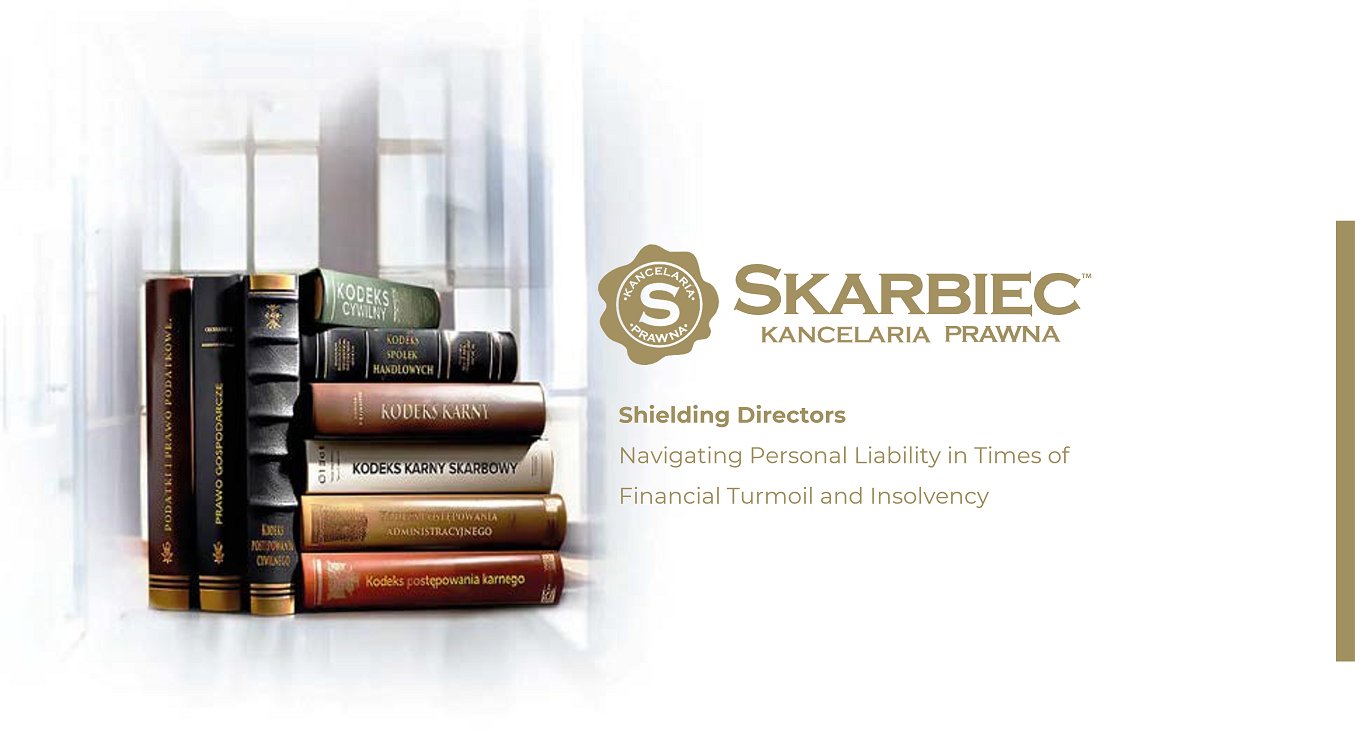
How does Polish law define the moment of company insolvency and the time frame for filing for bankruptcy?
Chapter 11
11.1 At what juncture does insolvency necessitate the filing for bankruptcy?
Under laws of Poland, bankruptcy is declared against a debtor who has become insolvent. The debtor is required to submit a petition for bankruptcy to the court no later than thirty days from the date on which the grounds for declaring bankruptcy arose.
The legislator has maintained the existence of two bases for debtor insolvency, which can be referred to as “loss of liquidity” and “excessive indebtedness.” The legislator introduced also numerous presumptions, detailed below, related to the construction of insolvency in order to facilitate the submission of bankruptcy petitions.
The debtor is considered insolvent if they have lost the ability to meet their financial obligations as they become due. It is presumed that the debtor has lost the ability to meet their financial obligations as they become due if the delay in meeting such obligations exceeds three months.
The debtor, being a legal entity or an organizational unit without legal personality, to which a separate law grants legal capacity, is considered insolvent also when their monetary obligations exceed the value of their assets, and this situation persists for a period exceeding twenty-four months. The assets mentioned above do not include elements that are not included in the bankruptcy estate. The monetary obligations mentioned above do not include future obligations, including obligations subject to a suspensive condition, as well as obligations towards a partner or shareholder under a loan or other legal transaction with similar effects.
It is presumed that the debtor’s monetary obligations exceed the value of his assets if, according to the balance sheet, his liabilities, excluding provisions for liabilities and obligations to related parties, exceed the value of his assets, and this situation persists for a period exceeding twenty-four months.
The court may dismiss a petition for bankruptcy declaration if there is no imminent threat to the debtor’s ability to meet his monetary obligations in the near future.
The court will dismiss a bankruptcy petition filed by a creditor if the debtor demonstrates that the claim is entirely disputed and the dispute arose between the parties before the bankruptcy petition was submitted.
The court will dismiss a bankruptcy petition if the assets of the insolvent debtor are insufficient to cover the costs of the proceedings or only cover those costs.
- Legal responsibility on part of directors is of formal nature
For the mere declaration of bankruptcy, the cause of the debtor’s insolvency and the timing of the submission of the bankruptcy petition are irrelevant. The bankruptcy proceedings are intended to protect the interests of the creditors of the insolvent debtor. However, the circumstances leading to insolvency and the timing of the petition submission are legally significant, albeit under different provisions.
11.2 Detailed guidelines from court rulings concerning the determination of the timing for filing for bankruptcy.
Considering the strict liability associated with the failure to timely file a bankruptcy petition, one would expect guidelines regarding the definition of the commencement of the deadline for filing a bankruptcy petition to be very clear and precise. However, the Supreme Court has provided a series of indications on how to interpret the grounds for bankruptcy declaration. While not denying their validity, it must also be noted that they are formulated in such an unclear manner that even the oracle at Delphi or Nostradamus would not be ashamed of them.
Let us quote just a few of them, which I mention in reference to Izabela Heropolitańska’s commentary.
1) A brief halt in debt payments due to temporary difficulties is not grounds for declaring bankruptcy, as insolvency within the meaning of Article 11, paragraph 1 of the Bankruptcy and Reorganization Law can only be considered when a debtor, due to lack of resources, fails to fulfill the majority of their obligations for an extended period of time (ruling of January 19, 2011, V CSK 211/10, Legalis);
2) One cannot adopt the view in a schematic manner that every, even a single, delay automatically triggers insolvency necessitating the submission of a bankruptcy petition (ruling of the Provincial Administrative Court of December 17, 2020, case number III SA/Wa 301/20, Legalis);
3) In accordance with the Supreme Court ruling of January 8, 2013 (case number III KK 117/12, BSN 2013, No. 3), the occurrence of a situation where the debtor ceases to fulfill its due obligations gives rise to the obligation to file a bankruptcy petition with the court, even if the debtor is not in a situation where its assets are insufficient to satisfy its debts. A possible solution for the debtor could be the sale of part of its assets or the assumption of new obligations;
4) According to the NSA in the ruling of March 6, 2018 (case number II FSK 2173/17, Legalis), insolvency occurs not only when the debtor lacks funds, but also when the debtor fails to meet obligations for other reasons.
In Judgment V CSK 211/10, the Supreme Court displayed a rather dark sense of humor, indicating that a brief pause in debt payments due to temporary difficulties does not constitute sufficient grounds for declaring bankruptcy. In other words, if the difficulties are only temporary, there are no grounds for a bankruptcy declaration, the deadline for submitting a petition does not commence, and there is no risk of shifting personal liability onto board members. However, if the difficulties prove to be only temporary, then the prerequisites for bankruptcy declaration have not yet been met.
Where is the humor in this, you may wonder?
The determination of whether the difficulties were indeed temporary or not can only be made ex post, with the benefit of hindsight, meaning when it is already too late to protect the board from secondary liability by submitting a bankruptcy petition on time. One can speculate that the Supreme Court intended to offer the board a lifeline by providing them with reasoning to avoid filing a bankruptcy petition, yet in reality, the Supreme Court unintentionally gave the drowning a razor blade to cling to – it is understood that a typical board will attempt to defend the company, deluding themselves with hopes that the difficulties are only temporary. Finding justification in Judgment V CSK 211/10 to delay filing a bankruptcy petition. Once the ability to view these difficulties as temporary is exhausted, it will be too late to submit a petition. Why? Because if the difficulties turn out not to be temporary, the deadline for declaring bankruptcy is not calculated from the day the difficulties ceased to be temporary but from the initial day when the debtor stopped meeting obligations.

Founder and Managing Partner of Skarbiec Law Firm, recognized by Dziennik Gazeta Prawna as one of the best tax advisory firms in Poland (2023, 2024). Legal advisor with 19 years of experience, serving Forbes-listed entrepreneurs and innovative start-ups. One of the most frequently quoted experts on commercial and tax law in the Polish media, regularly publishing in Rzeczpospolita, Gazeta Wyborcza, and Dziennik Gazeta Prawna. Author of the publication “AI Decoding Satoshi Nakamoto. Artificial Intelligence on the Trail of Bitcoin’s Creator” and co-author of the award-winning book “Bezpieczeństwo współczesnej firmy” (Security of a Modern Company). LinkedIn profile: 18 500 followers, 4 million views per year. Awards: 4-time winner of the European Medal, Golden Statuette of the Polish Business Leader, title of “International Tax Planning Law Firm of the Year in Poland.” He specializes in strategic legal consulting, tax planning, and crisis management for business.







